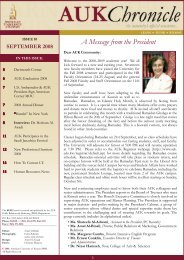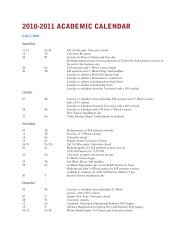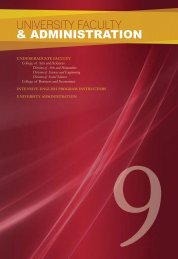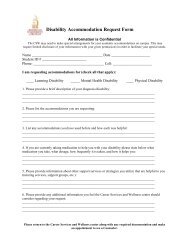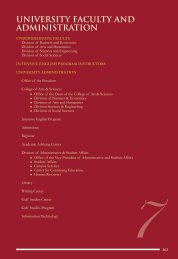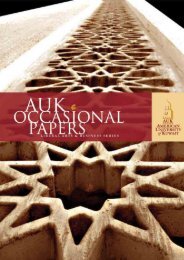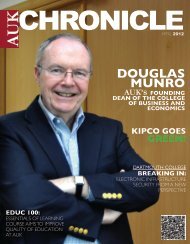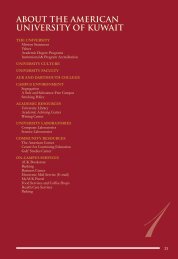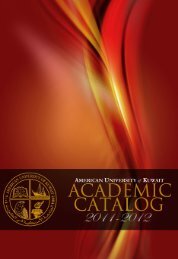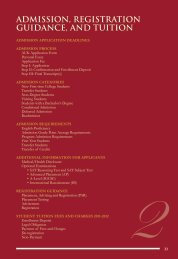This type of training leads to enhanced productivitywithin the organization.Although experiential learning in entrepreneurshipmay take place in numerous academic settings, veryfew courses and programs have been documented andevaluated. An article by Shawn P. Daly documented,“Student-operated Internet business: True experientiallearning in entrepreneurship and retail-management,”where students carried out their own business plans,product development and marketing operations.It also includes feedback from students and observationsand recommendations concerning the success of thestudent-operated business. (Daly, 2001). Anotherexample is the University of Calgary’s MBA program thatdocumented a recent MBA course offered to studentswho “create and grow their own expertise or lead andsustain growth and development in an existing enterprise”(Nikiforuk, 1997). Documentation of experiential learningcourses like these provides valuable information andopportunity for schools and instructors to use as a guidelinefor their course initiatives. The feedback and suggestionsthat schools offer from their previous experienceprovide constructive insight and guidance on how toprovide students with the greatest learning experience.Another example close to the topic of this paper is theEntrepreneurship and New Venture Creation (ENVC)course at Mount Allison University for students whoare seeking to gain hands-on experience, while learningthe complexity of running a student-operated business.Information from all aspects of the course is compiled,and suggestions for improvement in particular areas,such as the student evaluation process, are provided.The dynamics of this experiential learning approachhave been successful as students build on their skills,such as teamwork, leadership and problem-solving skills.Documentation of the student’s feedback from theirpersonal experience with the ENVC course at MountAllison also suggests improvements for the course infollowing years.The entrepreneurial venture of learning by experienceclearly has benefits in ways that students understandthe complexity of running their own organization.They employ a wider perspective within the businessworld, and learn the importance of networking within theircommunity. The everyday classroom learning is important,but does not provide the same type of skills that studentsdeveloped from these experiences. Experiential learningin entrepreneurship is successful in many educationalinstitutes that would agree to the importance of studentsengaging in such practices (Daly, 2001).In summary, Kolb (1978 & 1985) created the LearningStyles Inventory (LSI)) because he was not satisfiedwith the traditional methods of teaching managementprofessionals. His work helped people understand diverselearning processes and acknowledge that each personlearns in a different way. People felt the need for thistype of learning methodology because they understoodthe significance of integrated knowledge and experiencethat could be applied to real-life situations. Experientiallearning has been found to be friendly to the brain, mind,body, heart, and soul (Toncar & Cudmore, 2000; Wynd,1989; Gaidis & Andrews, 1990).Experiential pedagogy is a perfect match for theentrepreneurship model of interest in this paper. Thereview of the literature supports the ExperientialEntrepreneurship Model shown in Figure 1. Activitiesin the curriculum delivered through experiential learningapproaches lead to the integration of entrepreneurial skills,knowledge, attitudes and behaviors. Course feedback andpeer evaluation provide opportunities for summativeand formative evaluation. Recognition of success isevident in student awards, and success in business plancompetitions, in business and in co-curricular activities,as well as in teaching awards, faculty engagement in theattendant experiential pedagogy, research, funding, andthe ability to attract entrepreneurial speakers.The University ContextThe mission statement of the university reads as follows:Mount Allison University is committed to the creation anddissemination of knowledge in a community of higher learning,centered on [2250] undergraduate students, in an intimate andharmonious environment. Our teaching, research and creativeenterprise are combined with extracurricular activities, in a liberaleducation tradition, that emphasizes development of the wholeperson. This integrated approach involves collaborative efforts amongall members of the University community and leads to superiorscholarship, cultural understanding and appreciation, personal andsocial maturation, leadership development and informed citizenship.(Academic Calendar, 2006-7, p. 1)Bachelor degrees are offered in Arts, Commerce, FineArts, Music, and Science. The University “shapes leaderswho are critical thinkers, problem solvers and creativeparticipants in society” (Academic Calendar, 2006-7, p. 1).35
36The mission of the University and its setting in a smalltown (pop. 5000) in the southeastern corner of theprovince of New Brunswick offer several advantages forthose interested in the development of entrepreneurialcapability among students. First, the relatively opencurriculum fosters multiple ways of thinking. Any student,for example, has access to courses in all disciplines andinterdisciplinary programs of the three faculties of Arts,Science, and Social Sciences. Thus, students in Commerce(located in the Faculty of Social Sciences) intermingle inCommerce courses with students who are doing a majorin areas as diverse as Anthropology, Music, and Biology.Students in other degree programs may do a Major orMinor in Commerce. Secondly, the relatively small sizeof the student body encourages interaction amongstudents within and outside the classroom. Third, withabout 95 percent of courses scheduled between 8:30am and 5:30 pm, students have ample time to meet forcourses projects, as well as engage in extracurricularand co-curricular activities. Fourth, the reputation ofthe University attracts many national and international,high-energy, multi-talented students who are able to makea home for themselves in the residential atmosphere.Last, but not least, the town, which has thrivingbusiness and arts sectors is supportive of the University.Some examples of how the advantages of the universitysetting support the entrepreneurial model are as follows:• Students have access to professors for consultation.• Students are able to work in teams. Face-to-faceinteraction is encouraged.• Students have the time-space to handle complexprojects, such as starting a business.• Students can engage in projects that span disciplines,such as start biotechnology companies.• Students can access the resources (e.g., registration,licenses, etc.) needed to set up a business.The Entrepreneurial Footprint in the CommerceDepartmentEntrepreneurship happens through people. Mount Allisonhas long been recognized as a premier university whichbrings together faculty and full-time, undergraduate studentsfrom across the world. These bright, highly respectedpeople come together in a small, residential, interactiveatmosphere. Not surprisingly, big things “happen” atMount Allison, and entrepreneurial activity is no exception.In 1995-1996, the Commerce Department introduceda course called Entrepreneurship and New VentureManagement, followed by the introduction of SmallBusiness Management in 1997-1998. These courseswere taught (often in rotation) by a professor whosubsequently became the first Director of the DobsonCentre. (The Dobson Foundation funds a number ofcenters dealing with entrepreneurship across the country.)His interests were in micro-enterprise, specifically homebasedbusinesses; there were research collaborationswith a member of the Rural and Small Towns Program.Over time, collaborations between the Dobson Centre andthe Commerce Department were increased in focus andeven stability. Introduction to Entrepreneurship (addedin 2001-2002), was taught by the Director, who alsocollaborated with Commerce professors on the BusinessPlan Competition and on various aspects of the operationof the Dobson Centre (e.g., invitations to speaker events,case competition, micro-lending projects…). From theperspective of the Commerce Department the profile of theDobson Centre was certainly higher than it had ever been;there were shared successes and teaching collaborations.Within the Commerce Department, there has been a surgein interest in entrepreneurship over the past five years,due to the addition of new faculty members, the presenceof capable students, and the emergence of university andcommunity collaborations. Some examples of ExperientialEntrepreneurship that have already been realized are listedin the Appendix. Obvious examples are specific courses,such as Entrepreneurship and New Venture Creation, andthe experiential pedagogy that provides the underpinningfor their delivery. External competitions provided venuesto hone presentation skills and reality checks on businessplans. More unusual is the opportunity for students toextend their learning within the context of IndependentStudy and Special Topics courses. (The course outlinesfor these courses must be approved by the Department.)Functional courses, especially in the marketing area,also contain components, such as assignments andprojects, which contribute to the development of anentrepreneurial orientation. Curricular activities that spantwo or more courses, such as field trips that highlightbusinesses that are new or grew from a small start-up,also provide capacity for entrepreneurship. In the caseof the field trip to Hewlett-Packard in Boston, studentsraised a substantial proportion of the funding required.Occasions for guest speakers are also opportunitiesto illustrate entrepreneurship in action, as are eventssponsored by student associations and projects supportedthrough student leadership development programs.
- Page 2 and 3: About AUK Occasional Papers:The AUK
- Page 4 and 5: higher education is distinguished b
- Page 6 and 7: The Impact of a Glass Ceilingon Wom
- Page 8 and 9: more women a chance to flourish in
- Page 10 and 11: consider other factors such as the
- Page 12 and 13: academically unprepared…you must
- Page 14 and 15: EmotionalSignificant variations in
- Page 16 and 17: Advising and OrientationOther impor
- Page 18 and 19: etention. However, in addition, the
- Page 20 and 21: Hadi and Llabre (1998) assessed int
- Page 22 and 23: the event was encoded in parallel a
- Page 24 and 25: Public Health Impacts of Iraq’s 1
- Page 26 and 27: college work and have inadequate pr
- Page 28 and 29: memorization and repetition. This a
- Page 30 and 31: other in the pursuit of higher grad
- Page 32 and 33: for quality assurance, an organizat
- Page 34 and 35: RethinkingEntrepreneurship:Integrat
- Page 38 and 39: In short, Mount Allison students ha
- Page 40 and 41: Joplin, L. (1995). On defining expe
- Page 42 and 43: Figure 1. ExperientialEntrepreneurs
- Page 44 and 45: Kuwait - satellite television, cult
- Page 46 and 47: ReferencesAbt, V. & Seesholtz, M. (
- Page 48 and 49: interest in continuing to manipulat
- Page 50 and 51: Though corruption poses fundamental
- Page 52 and 53: A Cross-Cultural Modelof Innovation
- Page 54 and 55: were conceived as associations of c
- Page 56: others. In this case, confident pos
- Page 59 and 60: 58REFERENCESAmason, A. (1996) ‘Di
- Page 61 and 62: Shelton, C. and Darling, J. (2004)
- Page 63 and 64: 62• recycle natural resources use
- Page 65 and 66: 64Table Kuwait Fact Profile on Tran
- Page 67 and 68: Table Transportation and Associated
- Page 69 and 70: 68• Third, each mode of transport
- Page 71 and 72: 70• Prepare a Bank Group transpor
- Page 73 and 74: 7219. Stratford,A. (1974). Airports
- Page 75 and 76: 74may be developed in a safe and or
- Page 77 and 78: 28. Tables - 1 Environmental Manage
- Page 79 and 80: 6) EnvironmentalAwarenessNo baselin
- Page 81 and 82: 80Iran, the US, and HighlyEnriched
- Page 83 and 84: 82since the 1951 nationalization of
- Page 85 and 86: 8450% of the population is astonish
- Page 87 and 88:
86The US also approved the Shah’s
- Page 89 and 90:
88George W. Bush’s State of the U
- Page 91 and 92:
90when Iran could not keep up with
- Page 93 and 94:
92rich states, the decrease of natu
- Page 95 and 96:
94indigenous training. Specifically
- Page 97 and 98:
96It is important to note that Russ
- Page 99 and 100:
Table 1: Nuclear Powered States and
- Page 101 and 102:
100Foucault, Michel. “What are th
- Page 103 and 104:
102Ramazani, Rouhollah K. “Iran
- Page 105 and 106:
104My SCORE, OurMATCH: CommunityPar
- Page 107 and 108:
106with a mate while he does mechan
- Page 109 and 110:
108dimensions of life including for
- Page 111 and 112:
correlated to the commitment and on
- Page 113 and 114:
REFERENCESBryce, J, Frigo, T, McKen
- Page 115 and 116:
GDP $21,300, GDP growth rate 6.8%,
- Page 117 and 118:
• Less than half of the people su
- Page 119 and 120:
118TABLE 4: # 1 Gulf Country in Eco
- Page 121 and 122:
120• More men than women indicate
- Page 123 and 124:
TABLE 8: Why? X GenderGENDERMALE FE
- Page 125 and 126:
TABLE 11: Success in improving Livi
- Page 127 and 128:
TABLE 14: Success in preserving Cul
- Page 129 and 130:
• Gender wise, more men felt that
- Page 131 and 132:
TABLE 18: How foreign workers are t
- Page 133 and 134:
• In terms of the preference of e
- Page 135 and 136:
TABLE 24: Should Oil be the Basis f
- Page 137 and 138:
F i gur e 18: S hould K uwa it J oi
- Page 139 and 140:
13811. What do you think about the
- Page 141 and 142:
140Conditions of Kuwaiti Dependence
- Page 143 and 144:
1422) if the alien has no means of
- Page 145 and 146:
144offered Mubarak recognition as a
- Page 147 and 148:
146labor regulations and enforcemen
- Page 149 and 150:
148intensifying suspicion and hosti
- Page 151 and 152:
150Commission on Freedom of the Pre
- Page 153 and 154:
Even the viceroy of India, Lord Cur
- Page 155:
Christine PiconeAustralian College



